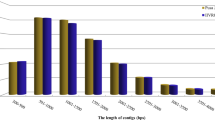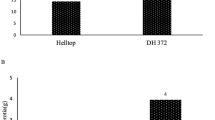Abstract
Rapeseed-mustard, the oleiferous Brassica species are important oilseed crops cultivated all over the globe. Mustard aphid Lipaphis erysimi (L.) Kaltenbach is a major threat to the cultivation of rapeseed-mustard. Wild mustard Rorippa indica (L.) Hiern shows tolerance to mustard aphids as a nonhost and hence is an important source for the bioprospecting of potential resistance genes and defense measures to manage mustard aphids sustainably. We performed mRNA sequencing of the R. indica plant uninfested and infested by the mustard aphids, harvested at 24 hours post-infestation. Following quality control, the high-quality reads were subjected to de novo assembly of the transcriptome. As there is no genomic information available for this potential wild plant, the raw reads will be useful for further bioinformatics analysis and the sequence information of the assembled transcripts will be helpful to design primers for the characterization of specific gene sequences. In this study, we also used the generated resource to comprehensively analyse the global profile of differential gene expression in R. indica in response to infestation by mustard aphids. The functional enrichment analysis of the differentially expressed genes reveals a significant immune response and suggests the possibility of chitin-induced defense signaling.

Similar content being viewed by others
Data availability
The raw FASTQ Illumina sequence data that support the findings of this study have been deposited in the NCBI Sequence Read Archive (SRR17327159, SRR17327158, SRR17346649, SRR17346648) under Bioproject PRJNA792073.
Change history
23 March 2024
A Correction to this paper has been published: https://doi.org/10.1007/s10142-024-01335-w
References
Bandopadhyay L, Basu D, Sikdar SR (2013) Identification of genes involved in wild crucifer Rorippa indica resistance response on mustard aphid Lipaphis erysimi challenge. PLoS ONE 8:e73632. https://doi.org/10.1371/journal.pone.0073632
Bose S, Gangopadhyay G, Sikdar SR (2019) Rorippa indica HSPRO2 expression in transgenic Brassica juncea induces tolerance against mustard aphid Lipaphis erysimi. Plant Cell, Tissue and Organ Culture. 136:431–443.n https://doi.org/10.1007/s11240-018-1524-4
Chen Y, Song Y, Liu J, Xu G, Dou D (2022) Ubiquitination of receptorsomes, Frontline of Plant Immunity. Int J Mol Sci 23(6):2937. https://doi.org/10.3390/ijms23062937
Dhillon MK, Singh N, Yadav DK (2022) Preventable yield losses and management of mustard aphid, Lipaphis erysimi (Kaltenbach) in different cultivars of Brassica juncea (L.) Czern & Coss. Crop Protec 161:106070. https://doi.org/10.1016/j.cropro.2022.106070
Ghosh S, Sikdar SR (2021) Identification of defence proteins, essential for aphid tolerance in Indian mustard. Arthro-Plant Interac 15:337–351. https://doi.org/10.1007/s11829-021-09824-6
Kansman JT, Basu S, Casteel CL, Crowder DW, Lee BW, Nihranz CT, Finke DL (2022) Plant water stress reduces aphid performance: exploring mechanisms driven by water stress intensity. Front Ecol Evol 10:846908. https://doi.org/10.3389/fevo.2022.846908
Lin L-Z, Sun J, Chen P, Zhang R-W, Fan X-E, Li L-W (2014) Harnly JM. Profiling of glucosinolates and flavonoids in Rorippa indica (Linn.) Hiern. (Cruciferae) by UHPLC-PDA-ESI/HRMSn. J Agric Food Chem 62:6618–6629
Mandal P, Sikdar SR (2003) Plant regeneration from mesophyll protoplasts of Rorippa indica (L.) Hiern, a wild crucifer. Curr Sci 85:1451–1454
Mi H, Thomas P (2009) PANTHER pathway: an ontology-based pathway database coupled with data analysis tools. Methods Mol Biol 563:123–140. https://doi.org/10.1007/978-1-60761-175-2_7
Muzaffar A, Chen YS, Lee HT, Wu CC, Le TT, Liang JZ, Lu CH, Balasubramaniam H et al (2024) A newly evolved rice-specific gene JAUP1 regulates jasmonate biosynthesis and signalling to promote root development and multi-stress tolerance. Plant Biotechnol J Jan 9. https://doi.org/10.1111/pbi.14276. Epub ahead of print. PMID: 38193234
Sarkar P, Jana K, Sikdar SR (2017) Overexpression of Rorippa indica defensin enhances aphid tolerance in Brassica juncea. Planta 246(5):1029–1044. https://doi.org/10.1007/s00425-017-2750-4
Shi Q, George J, Krystel J et al (2019) Hexaacetyl-chitohexaose, a chitin-derived oligosaccharide, transiently activates citrus defenses and alters the feeding behavior of Asian citrus psyllid. Hortic Res 6:76. https://doi.org/10.1038/s41438-019-0158-y
Takagi M, Hotamori K, Naito K, Matsukawa S, Egusa M, Nishizawa Y, Kanno Y, Seo M, Ifuku S, Mine A, Kaminaka H (2022) Chitin-induced systemic disease resistance in rice requires both OsCERK1 and OsCEBiP and is mediated via perturbation of cell-wall biogenesis in leaves. Front Plant Sci 13:1064628. https://doi.org/10.3389/fpls.2022.1064628
Wan J, Tanaka K, Zhang XC et al (2012) LYK4, a lysin motif receptor-like kinase, is important for chitin signaling and plant innate immunity in Arabidopsis. Plant Physiol 60(1):396–406. https://doi.org/10.1104/pp.112.201699
Ye W, Munemasa S, Shinya T et al (2020) Stomatal immunity against fungal invasion comprises not only chitin-induced stomatal closure but also chitosan-induced guard cell death. Proc Natl Acad Sci U S A 117(34):20932–20942. https://doi.org/10.1073/pnas.1922319117
Zhou Y, Zhou B, Pache L, Chang M, Khodabakhshi AH, Tanaseichuk O, Benner C, Chanda SK (2019) Metascape provides a biologist-oriented resource for the analysis of systems-level datasets. Nat Commun 10(1):1523. https://doi.org/10.1038/s41467-019-09234-6
Acknowledgements
The work is funded by a project [Project No. SR/WOS-A/LS-45/2018 (G)] granted to Dr. Lekha Bandopadhyay from the Department of Science & Technology, Ministry of Science and Technology, India under the Women Scientist Scheme-A. The authors are thankful to Bose Institute, India for providing the necessary facilities. The authors acknowledge Sandor Lifesciences, India for their support in RNA-Seq data generation, processing and analyses. The authors are thankful to Prof. Zhumur Ghosh, Bose Institute, and Ms. Troyee Das, Bose Institute for their help in understanding the RNA Seq data. The authors are also thankful to Prof. Shubho Chaudhuri, Bose Institute for his administrative support throughout the course of this study. Lastly, the authors heartily thank two anonymous reviewers for their thoughtful suggestions to improve this report.
Funding
The work is funded by a project [Project No. SR/WOS-A/LS-45/2018 (G)] granted to Dr. Lekha Bandopadhyay from the Department of Science & Technology, Ministry of Science and Technology, India under the Women Scientist Scheme-A.
Author information
Authors and Affiliations
Contributions
Lekha Bandopadhyay, Debabrata Basu, and Samir Ranjan Sikdar contributed to the concept and design of this work. Lekha Bandopadhyay prepared the experimental materials and contributed to the analyses and interpretation of the data. Lekha Bandopadhyay wrote the manuscript. All authors read and approved the final version of the manuscript.
Corresponding authors
Ethics declarations
Ethical approval
Not applicable.
Competing interests
The authors declare that they have no competing interests.
Additional information
Publisher’s Note
Springer Nature remains neutral with regard to jurisdictional claims in published maps and institutional affiliations.
The original online version of this article was revised: The original article contains an error. Supplementary information 3 to 6 (the Excel files) have lost the Table tags/text headings (Table S7 to Table S10).
Electronic supplementary material
Below is the link to the electronic supplementary material.
Rights and permissions
Springer Nature or its licensor (e.g. a society or other partner) holds exclusive rights to this article under a publishing agreement with the author(s) or other rightsholder(s); author self-archiving of the accepted manuscript version of this article is solely governed by the terms of such publishing agreement and applicable law.
About this article
Cite this article
Bandopadhyay, L., Basu, D. & Ranjan Sikdar, S. De novo transcriptome assembly and global analysis of differential gene expression of aphid tolerant wild mustard Rorippa indica (L.) Hiern infested by mustard aphid Lipaphis Erysimi (L.) Kaltenbach. Funct Integr Genomics 24, 43 (2024). https://doi.org/10.1007/s10142-024-01323-0
Received:
Revised:
Accepted:
Published:
DOI: https://doi.org/10.1007/s10142-024-01323-0




